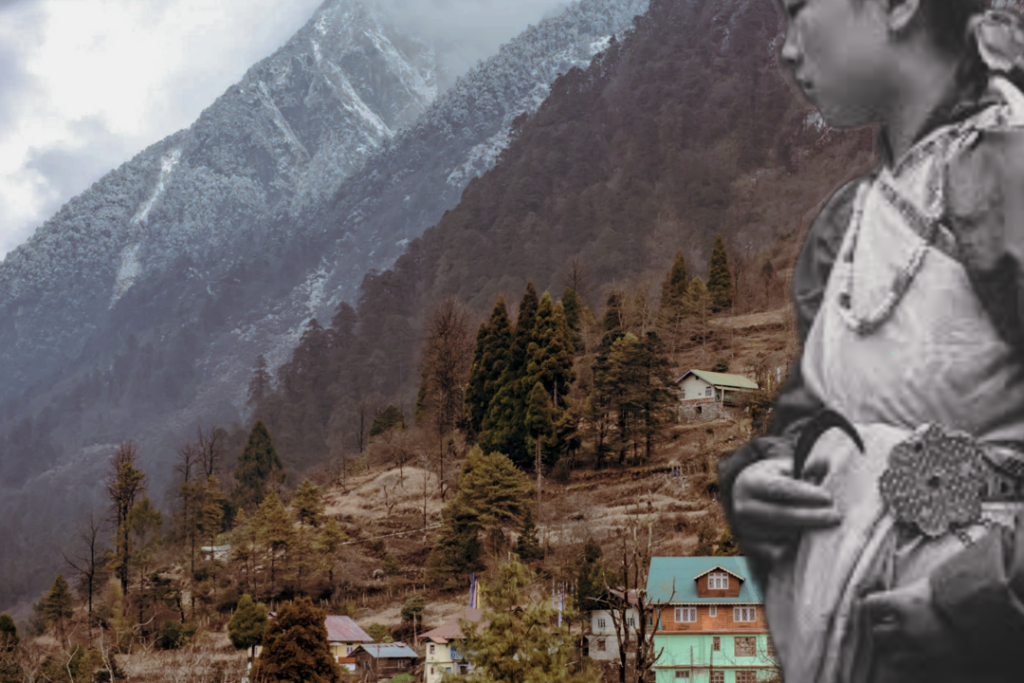My sister’s favourite Lepcha song is not any of the current, modern songs ruling the local charts. Hers is a folk song known as ‘Muntanchi Lungten.’ Written by elders, this song is for the future generations of the Lepcha. It is a plea to remember our roots, and not drift so far in the future that we are unmoored.
Fewer and fewer people speak Lepcha, the language of our Indigenous people in Sikkim, but there are many efforts made to revive and retain our words and stories. We have a saying that a plant without roots is considered dead, similarly, a culture severed from its rich language, is one grasping for air.
I have translated it here as an act of remembering. It is meant to be sung by children and is usually played during cultural activities of our Lepcha community
Mutanchi Lungten, Traditions of the Tongue (here mutanchi means Lepcha, referring to our mother tongue, and lungten means tradition)
Mutanchi Lungten Setbolay Ren Ryet Song | Oh elders, please teach the traditions of our tongue
Dun bolay Yuh tho shyo Aungkup Kayu Gun | Tell us and we, children of this generation will learn.
Yuh tho shyo Aungkup Kayu Gun | We children will learn.
Kado Lungten, kado nun muchyam gong | If we don’t preserve our cultural richness
Kado Amu Ring kado nun Muzyok gong | If we don’t speak in our mother tongue
Tuh nun Aye! | Then who will!
Ryak nun Chom nun Thobotay | Do seek it and keep it safely.
Rungutaungmu la chomba | As long as the two mighty rivers (Rungyu and Rungit of Sikkim) meet.
Ithbu Debu Rum sa Thyujee nun | From the blessings of our almighty god.
Rongkup sa Lungten Icha Chom Da moo | Our culture and traditions are preserved.
Nimshim Nyu sa Milyu Ray Sonong Zong | Humans are beautiful like snow
Dun knee Thom ka Sungzot Pong | Tell them about all our stories
Aungkup song Ryem Tongyet Thomka Auh | Let our children inherit these stories
Mithup Mithup chom shyo sung pong re | These stories will flourish over centuries
Aungkup Plongka Munlom Zong Tho Thyo Shyo | A gift to our children.
Tomsung Arrey Ikzuh Thet | Stories of our present will be foretold in the future.
This song is not as popular among young people in our tribe. With increased global, western cultural influences and urbanization, we risk losing language, stories, and songs of nature and our tribe. Inspired by the song of our roots, here is a poem I wrote:
I am because
We are
We are not known by our surname
But from our Anum Chu (mountains),
From Anom and Anum Aungkyongsong (rivers)
Our mother Rungyu and Father Rungeet
Our eldest brother Anum Kongchen (Mt Kanchenjunga) and
by all the clans connected
within us.
Tangled in the roots of identity
I walked across rivers to find mine
Far from modern complexities
Through Indigenous pathways
I chose
‘Rongmit’ as I title myself
I wear my congruity as dumvon,
Ferru (ornaments) and syumbrang bur (a silver ornament around our waist).
I am dweller and protector
The sounds
Of the trumpets and voices
Of the thriving
Roots
Grow striking the very rocks of uncertainty
This is not a Shukpot (poem)
This is a
Spirit of the growing
Roots within me.
Mother this is me
My identity
I am rooted but I flow
.
.
.
.
.
Notes:
Ithbu Debu Rum: Known as the creator god of the Lepchas who resides in the secret village behind Mount Kanchenjunga. The God who looks after her children and nature.We Lepchas also call her Aamu the Mother Creator.
Rungyu and Rungit: The two major rivers of Sikkim emerging from the sources of Mt Kingchum and Mt Dongka. They eventually flow into the major Bay of Bengal. There is a story which says that Mayel Lyang (Sikkim) was almost flooded due to the outburst of these rivers. Hence on the 8th of August every year the Lepchas celebrate Tendong Lho Rumfaat as remembering the great incident that took place, and our God who saved the people back then.


